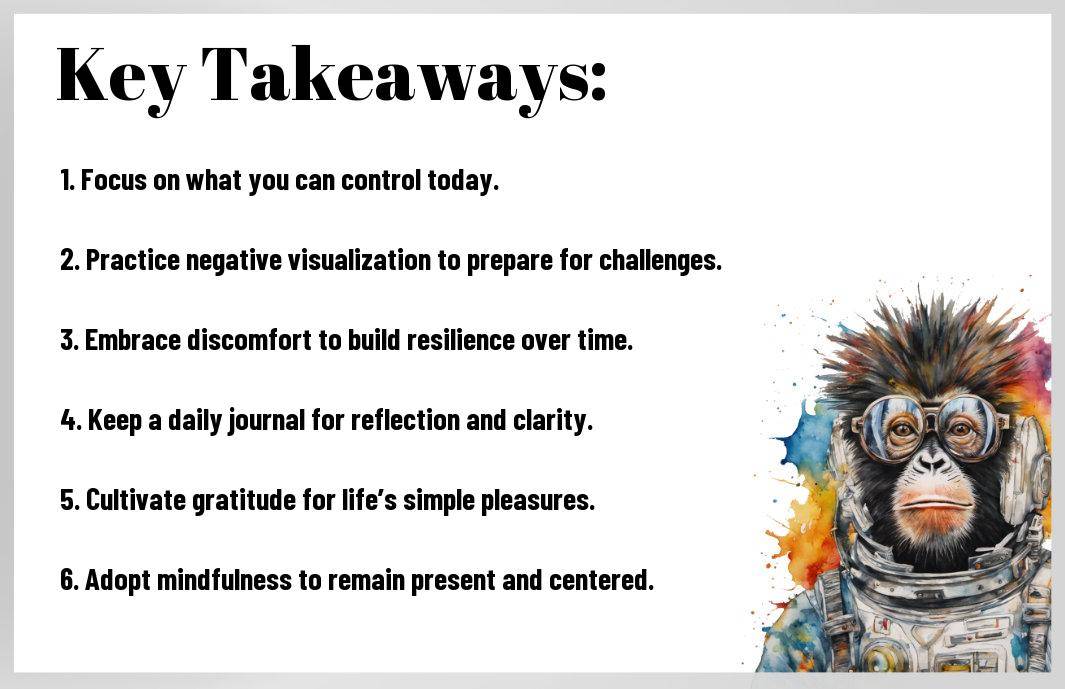
Newsletter Subscribe
Enter your email address below and subscribe to our newsletter

Enter your email address below and subscribe to our newsletter

You might feel overwhelmed by stress at times, but Stoicism offers powerful strategies to help you regain control and find peace. I’ve discovered that by embracing Stoic principles, I can shift my focus from external chaos to my internal responses. In this blog post, I’ll share practical tips to incorporate Stoicism into your daily routine, empowering you to manage stress effectively and cultivate a more resilient mindset. Let’s initiate on this journey together and explore how these timeless teachings can make a difference in your life.


Against the backdrop of life’s uncertainties, I find solace in Stoicism, an ancient Greek philosophy that teaches us to focus on what we can control and to accept what we cannot. This practical approach emphasizes virtue and wisdom, helping individuals cultivate a mindset of resilience. As I explore Stoicism, I come to appreciate its timeless teachings that encourage us to maintain a sense of tranquility amidst the chaos of modern life.
Above all, I have discovered that embracing Stoic principles can lead to profound mental clarity and emotional stability. By recognizing the transience of life and the inevitability of challenges, I feel more equipped to navigate stressors without becoming overwhelmed. Stoicism encourages me to reflect on my thoughts and reactions, fostering a sense of agency and empowerment in the face of adversity.
Stoicism’s practical applications have also contributed to my overall well-being. By focusing on my responses rather than external circumstances, I create a space of calm within. This shift helps me assess situations more objectively, enabling me to make decisions based on reason instead of emotional impulses. Ultimately, the teachings of Stoicism inspire me to cultivate a more balanced and mindful perspective, allowing stress to roll off my back like water off a duck.
Any journey towards relieving stress begins with understanding what triggers it. By taking the time to recognize the elements in your life that contribute to stress, you can gain insight into your emotional landscape. This self-awareness is a foundational aspect of Stoicism, which encourages us to observe our thoughts and feelings without judgment. I’ve found that simply becoming aware of my stressors is often the first step in reducing their impact on my daily life.
Recognizing specific triggers is crucial for managing stress effectively. I often keep a journal to jot down situations or thoughts that lead to feelings of anxiety or frustration. By consistently tracking these instances, I identify patterns that might not be immediately obvious. For instance, I learned that my stress levels spiked when I overcommitted to social obligations or when I worked too long without breaks. Understanding what activates these feelings gives me a better chance of avoiding or mitigating them in the future.
By shifting my perspective, I’ve discovered that I can transform how I interact with my stressors. Instead of viewing challenges as insurmountable obstacles, I try to see them as opportunities for growth or learning. Stoicism teaches us that while we can’t control external events, we can control our reactions to them. This mindset of acceptance helps me navigate difficult situations with a calmer, more collected response. When I find myself feeling stressed, I ask myself how I can reframe the situation in a more constructive way.
Even when the pressures of life seem overwhelming, adopting this perspective can be a game-changer. I find that reframing stressful events allows me to process and manage them better. For instance, instead of dreading a busy work week, I try to view it as a chance to showcase my skills and push my boundaries. This shift can transform stress into a motivating force rather than an oppressive weight. By consistently applying this Stoic principle, I cultivate resilience and, ultimately, a greater sense of peace in my life.
All of us deal with stress in different ways, but I’ve found that practicing mindfulness is one of the most effective strategies for managing it. Mindfulness is about being present in the moment, letting go of worries about the past or future, and connecting with what is happening right now. It can significantly help in alleviating the chaos that often leads to stress, and grounding yourself in the present can be incredibly calming.
Against the backdrop of our busy lives, it’s surprisingly easy to get lost in the whirlwind of thoughts, regrets, and anxieties. I often find my mind racing with a million things at once. Whenever I catch myself spiraling into overthinking, I make it a point to take a deep breath and center myself. Staying present is about embracing each moment, whether it’s sipping a cup of coffee or simply feeling the sun on my skin. By training my mind to focus on these simple experiences, I’ve noticed a decrease in my overall stress levels and an increase in my appreciation for life’s little joys.
Against common perceptions, practicing mindfulness doesn’t have to be complex or time-consuming. I’ve learned that small, intentional acts throughout my day can have a significant impact. For example, dedicating a few minutes to mindful breathing or focusing my thoughts as I eat my meals can ground me. Techniques like scanning my body for tension, walking in nature and fully absorbing the sights and sounds around me, or even keeping a gratitude journal help integrate mindfulness seamlessly into my routine.
It’s important to find the techniques that resonate with you personally. You might enjoy guided imagery or simply sitting in silence for a few minutes each day. I’ve found that exploring various mindfulness techniques allows me to discover what works best for my lifestyle, making it easier to incorporate into my daily routine. Whatever approach you choose, trust me, taking those moments to be fully present can transform how you handle stress and enrich your overall well-being.
Not everyone feels comfortable with the idea of negative visualization; however, I find that it can be a surprisingly effective tool for managing stress. The Stoics believed that by picturing the worst-case scenario, we can cultivate a sense of gratitude for what we have and build resilience against future adversities. It’s not about being pessimistic; instead, it’s about preparing my mind for potential challenges. When I train myself to visualize setbacks or losses, I create a mental safety net that helps me navigate life’s unpredictability with more ease. By practicing this technique, I often feel more grounded and ready to tackle my obstacles head-on.
Embracing the art of anticipating challenges can be a game-changer in how I approach stress. When I take the time to think about what might go wrong in any situation, whether it’s a presentation at work or an important personal event, I find that it reduces my anxiety. Instead of being blindsided by unexpected hiccups, I can strategize and come up with contingency plans. This process not only helps me feel more secure but also empowers me to tackle hurdles with greater confidence. It’s like taking a mental rehearsal for life’s unpredictability, making me better prepared for anything that comes my way.
After considering potential setbacks, I focus on preparing for the unexpected. Life is full of surprises, and by expecting the unforeseen, I can handle surprises with more grace. For instance, if I’m going on a trip, I’ll think through possible scenarios like flight delays or lost luggage, and pack accordingly. By having a backup plan or even just the mindset that things may not go perfectly, I feel less stressed when things go awry. Keeping this mindset has taught me that flexibility is key, and surprises don’t have to derail my peace of mind.
Indeed, when I allow myself to acknowledge that unpredictability is a part of life, it shifts my perspective greatly. Instead of being overwhelmed, I embrace the fact that not everything will go as planned. This perspective enables me to sidestep unnecessary worry and encourages a proactive mindset, allowing me to navigate life’s twists and turns with curiosity rather than fear. I often find solace in knowing that I’ve prepared for the unexpected, enjoying the journey regardless of where it takes me.

Once again, I find myself reminded of the power of acceptance in my journey toward stress relief through Stoicism. Acceptance is not about resigning myself to circumstances; rather, it means acknowledging the reality of a situation without letting it overwhelm me. When I cultivate acceptance, I free myself from the shackles of constant worry and allow myself to focus on what I can control—my responses, my actions, and my attitude. This shift in mindset empowers me to approach life’s challenges with a sense of calm and resilience, knowing that some things are simply beyond my reach.
An important aspect of exercising acceptance is learning to let go of control. Many times, I find myself fixated on outcomes, trying to micromanage every detail of a situation. However, holding on too tightly often leads to frustration and anxiety. By embracing the concept of letting go, I remind myself that I cannot dictate the universe’s course. Instead, I focus on what I can influence, such as my effort and attitude, while releasing my grip on the outcomes themselves. This practice helps to lighten my mental load, allowing me to find more joy in the present moment.
Among the many insights Stoicism offers, finding peace in the present moment is one of the most liberating. In our fast-paced world, I often catch myself dwelling on past regrets or worrying about future problems. However, when I consciously shift my focus to the here and now, I cultivate a sense of peace that allows me to enjoy life as it unfolds. This practice involves mindfulness—paying attention to my thoughts, sensations, and surroundings without judgment. By anchoring myself in the present, I find that stress dissipates, and I can appreciate the beauty of everyday moments.
Finding peace in the present moment requires practice and patience. I remind myself to take a few deep breaths, observe my surroundings, and fully engage in whatever activity I’m doing, whether it’s sipping my morning coffee or going for a walk. Each time I bring my awareness back to the here and now, I strengthen my ability to stay grounded. Over time, these moments of mindfulness become a refuge from stress, allowing me to navigate life’s ups and downs with grace and resilience.
Many of us seek ways to bolster our ability to bounce back from life’s challenges, and Stoicism provides a robust framework for cultivating resilience. By embracing the Stoic principles of acceptance and perspective, we can equip ourselves to navigate difficult situations with greater strength. I find that when I adopt a Stoic mindset, I am less likely to be overwhelmed by stress, as I am reminded that my thoughts and reactions play a significant role in shaping my experience. This focus on the internal rather than external helps me to feel more empowered and in control of my responses, no matter what life throws at me.
An necessary component of building resilience is cultivating inner strength through self-awareness and reflection. I try to engage regularly in practices like journaling or meditation, where I can explore my thoughts and emotions. This not only helps me process experiences but also allows me to identify patterns in how I react to stress. By understanding my triggers, I can consciously choose to respond with a calm presence rather than simply reacting out of habit. This practice of mindfulness strengthens my inner resilience, giving me the confidence to face challenges with a steady mind.
Between every challenge I face lies an opportunity for growth, and embracing adversity as a teacher has significantly impacted my journey toward resilience. When I encounter obstacles, I strive to shift my perspective and view them as lessons rather than burdens. This approach allows me to extract valuable insights from difficult situations, turning potentially negative experiences into avenues for personal development. I’ve found that when I approach adversity with curiosity, asking myself what I can learn or how I can grow from it, I emerge stronger and more adaptable than before.
It becomes clear that viewing challenges as opportunities not only helps me to cope with stress better but also fosters a deeper sense of gratitude for the lessons learned along the way. By reframing my mindset, I transform struggles into stepping stones that contribute to my resilience, reinforcing my ability to face future difficulties with confidence. Each time adversity knocks on my door, I find comfort in knowing that, ultimately, it can lead to a richer, more fulfilling life experience.
From above, I’ve explored how applying Stoicism principles can effectively help in managing stress. By focusing on what is within our control, practicing mindfulness, and letting go of unproductive thoughts, I have found that I can navigate life’s challenges with greater ease. Each Stoic practice provides not just a philosophical framework but also practical steps that you can easily fit into your daily routine. It’s empowering to know that I can cultivate resilience and tranquility by simply shifting my mindset and utilizing these timeless strategies.
If you’re interested in diving deeper into how Stoicism can aid in reducing stress, I recommend checking out How to use Stoicism to deal with stress and anxiety – Quora. It’s filled with insightful advice that complements what we discussed. By incorporating these Stoic approaches into your life, you may discover a more peaceful, balanced way of handling stress that enhances your overall well-being. I’m excited for you to initiate on this transformative journey!
A: Stoicism is an ancient Greek philosophy that teaches the development of self-control and resilience as a means to overcome destructive emotions. By focusing on what we can control and letting go of what we cannot, Stoicism helps individuals manage stress by fostering a more balanced perspective in challenging situations.
A: Practical Stoic exercises include daily reflections, journaling about your thoughts and emotions, and practicing negative visualization. By reflecting on personal experiences and employing negative visualization, you can better appreciate what you have, leading to reduced anxiety and stress.
A: You can incorporate Stoic principles by starting each day with a morning reflection on your goals and mindset. Throughout the day, practice mindfulness by focusing on your responses to challenges and engaging in evening reflections to gauge your reactions and areas for improvement.
A: Gratitude is an vital component of Stoicism as it encourages individuals to acknowledge the positive aspects of their lives, fostering contentment. By regularly practicing gratitude, you can shift your focus away from stressors to appreciate what truly matters, thus relieving tension and anxiety.
A: Stoic teachings emphasize understanding the difference between what is within our control and what is not. In uncertain situations, focusing on your responses rather than the outcomes can help reduce worry and maintain a sense of peace, enabling clearer thinking and better decision-making.
A: Yes, Stoicism can enhance interpersonal relationships by promoting empathy and understanding. By practicing patience and accepting that others may act outside your control, you can improve communication and reduce conflicts, leading to less stress in your interactions.
A: Yes, several Stoic texts can provide guidance on managing stress. “Meditations” by Marcus Aurelius, “Letters from a Stoic” by Seneca, and “The Enchiridion” by Epictetus offer timeless advice and practical strategies that can be applied to daily life for stress relief and emotional resilience.